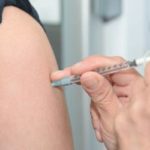1. Completion of the primary vaccination series against COVID-19 amongst individuals who had previously recovered from the infection reduced the rate of reinfection by approximately 50% in this retrospective cohort study.
2. Patients who lived or worked in long-term care homes had higher rates of infection and reinfection than the general population.
Level of Evidence Rating: 2 (Good)
Study Rundown: Vaccination against COVID-19 is an important public health measure known to significantly reduce the rate and severity of infection. It remains possible to become reinfected with COVID after having recovered from infection, although the relationship between vaccination and reinfection risk is unclear. This study sought to describe the rate of reinfection amongst individuals who had previously recovered from COVID-19 and received protective vaccination after initial infection.
Data from a total of 100,517 individuals who had been diagnosed with COVID-19 and subsequently remained unvaccinated for 90 days was collected. During the follow-up period, 56.6% of these individuals received at least 1 dose of the vaccine. The median time between first and second COVID-19 infection for those who became reinfected was approximately 7 months. The risk of reinfection was much higher amongst unvaccinated long-term congregate care (LTCC) residents and employees compared to the unvaccinated general population. The reduction in risk of reinfection secondary to COVID-19 vaccination was approximately 50% amongst LTCC residents and staff and greater than 60% in the general population.
This retrospective cohort study reinforces the notion that vaccination against COVID-19 is an effective public health strategy for reducing the rate of infection and reinfection. This data is particularly important for high-risk individuals, including LTCC employees and residents. Strengths of this study include the large sample size and clinical utility of these findings. Limitations include the use of retrospective databases to assess reinfection rates which likely underestimates the true number of reinfections. Additionally, some misclassification bias may be introduced because the available data did not account for any vaccinations received out of state. Future research in this area should seek to determine the optimal time point for vaccination including the receipt of ‘booster’ doses to prevent reinfection in the long-term.
Click here to read this study in JAMA
Relevant reading: COVID-19 vaccination: the road ahead
In Depth [retrospective cohort]: This retrospective cohort study was conducted amongst residents of Rhode Island, USA. Statewide health surveillance data was collected between March 2020 and December 2021. Eligible participants were individuals 12 years or older who were unvaccinated at the time of COVID-19 diagnosis, and who remained unvaccinated for 90 days after initial infection. The overall cohort was divided into three categories: residents of long-term congregate care (LTCC) settings, LTCC employees and the general population.
The risk of reinfection at 9 months for unvaccinated individuals was 13% (95% confidence interval 12-14%) amongst LTCC residents, 10% (8.8-11.5%) for LTCC staff, and 1.9% (1.8-2.0%) amongst the general population. Regression analysis demonstrated that completion of COVID-19 primary vaccination series (two doses) offered 62% (95% CI, 56%-67%) protection for the general population, 49% (95% CI, 23% to 66%) for LTCC employees, and 49% (95% CI 26%-65%) for LTCC residents. Proportional hazard models further identified factors associated with modified risk of reinfection, including hospitalization for initial infection (adjusted hazard ratio [AHR] 1.91, 95% confidence interval 1.56-2.33), and White race. Male sex (0.74, 0.67-0.83) and reporting symptoms during the initial infection compared to asymptomatic individuals (0.58, 0.51-0.66) were protective against reinfection.
Image: PD
©2022 2 Minute Medicine, Inc. All rights reserved. No works may be reproduced without expressed written consent from 2 Minute Medicine, Inc. Inquire about licensing here. No article should be construed as medical advice and is not intended as such by the authors or by 2 Minute Medicine, Inc.


